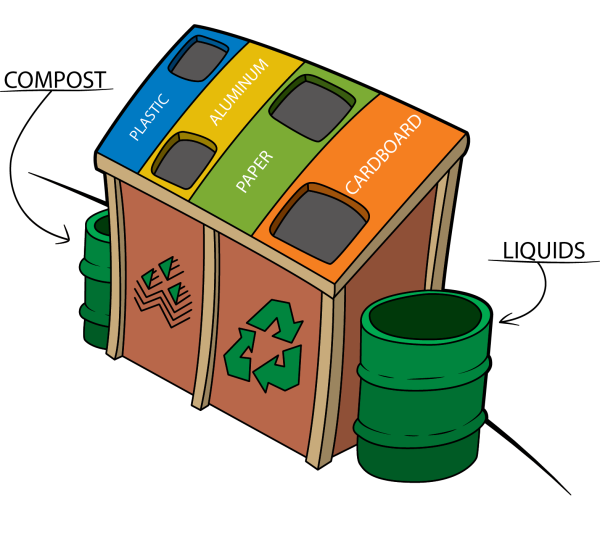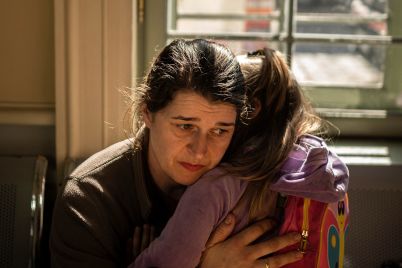By PAULETTE PARKER
News Editor
Washtenaw Community College could one day be the nation’s first waste-free campus. A student-developed initiative was recently approved that will improve the way WCC recycles waste, decreasing its carbon footprint and raising awareness of the importance of positively contributing to the environment.
The Recycling Initiative is the brainchild of WCC’s political science and STEM clubs and was inspired by a December 2013 story in The Voice that featured a photo of a dumped trash bag that highlighted recyclable materials discarded as waste on campus.
“The club always wanted to get involved in an environmental issue, It’s just, which one do we have the capability of trying to take on?” said WCC political science major and former political science club president, Steve Kwasny, 27, of Ann Arbor.
WCC’s 10 recycling receptacles found in the Student Center are currently sorted on the second floor of the TI building. Some waste is so soiled that it is no longer recyclable.
“They told me a rule of thumb. For every 15 pounds of recyclables they get, four to five are ruined because it’s just soiled and soaked with coffee, water and grease,” Kwasny said. This initiative aims to improve these numbers.
The current receptacles have slots for trash, paper and containers. However, the opening for containers is not large enough to accommodate many food containers discarded on campus, and there is no separate place for liquids.
The modified design would essentially slice the top off of the current model and create four slots for paper, plastic, aluminum and cardboard. Side containers for liquid waste and organic food materials would be added.
“Just removing liquids from recycled goods increases the value by four times. They call it clean recycling,” Kwasny said. The initiative combines elements of the recycling programs at Dartmouth College and the University of Maryland, both of whom pioneered the idea of recycling at source. WCC’s current policy was also researched to see what needed to be adjusted.
“Believe it or not, the college agreed to have recycling at a rate of 75 percent about eight years ago for right now, 2015,” Kwasny said. “Right now, it’s told we’re at 37.5. We’ve been pushing for this for quite some time now.”
Kwasny and the other students involved in developing the initiative initially presented their proposal to WCC’s board of trustees one year ago. However, they were told that, at that time, resources were going to be put into a nature trail where students could learn to forage for their own food. They have been pushing the initiative again since the fall of 2014.
“There were a lot of emails ignored, a lot of ‘Okay, we’ll work with you,’” Kwasny said. At this year’s Earth Day, they obtained almost 600 signatures on a petition in support of their idea. The students addressed the proposal for a second time at this April’s board meeting. Trustees expressed their support for the proposal.
“I think it’s an excellent proposal. If you want to put it under as part of the strategic plan, that is student success if I’ve ever seen it because they are going to be able to put that on their resume, and that’s going to put them at the top of job applications, I think,” said trustee Christina Fleming at the meeting.
“They had a table at Earth Day, and they are working really hard on this thing. It’s great to see, and that was a nice presentation,” said trustee Stephen Gill during his meeting remarks. “We should try to do whatever we can to support this.”
While the initiative has been approved, there is currently no timeline on the completion of the project. Although the project will cost around $5,000 to modify the 10 receptacles, in the long run, it will save WCC money based on the theory that there will be no waste, therefore, no trash bill, and bring in additional revenue. It will also help save our water in a time where western states are experiencing extreme drought.
“We only have so much freshwater. And with so much of the world fighting over water, we might as well try to make an effort to protect ours since we have so much,” Kwasny said. The political science and STEMS clubs will spend time in the Student Center educating people. Some environmental science instructors have also allocated class time for them to talk about their idea.
“It’s good to have supporting instructors allow time for those ideas because I took the environmental science class, and there’s really no free time in that class,” Kwasny said. He says education is going to be key.
“This is a new idea; we want to try and make this cultural habit,” Kwasny said. “It’s not extremely time consuming; it’s just making a readjustment.” He is aware this is not a cure-all, but it is a step in the right direction.
“We’re hoping this helps inspire future students,” Kwasny said. “Innovation is what drives this nation.”


